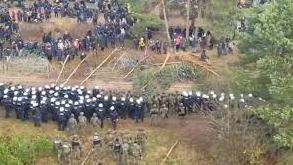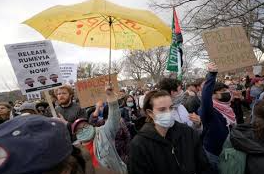
Thousands Face Freezing Conditions as Geopolitical Tensions Escalate
A growing humanitarian crisis is unfolding at the Poland-Belarus border, where thousands of migrants, including families with young children, are trapped in freezing conditions with little food or shelter. The situation has become a flashpoint for geopolitical tensions between Belarus, the European Union (EU), and their allies.
What’s Happening?
Since Monday, approximately 2,000 migrants have camped along the Belarusian side of the border, seeking to cross into Poland, an EU member state. They face barbed wire fences and thousands of Polish soldiers deployed to prevent illegal crossings. Videos and images have shown babies as young as a few months old enduring harsh conditions, with some families reporting days without food.
Reports suggest that Belarus has encouraged migrants from war-torn nations like Syria and Iraq to travel to its territory, with promises of access to Europe. In response, Polish authorities recorded nearly 1,000 attempted border crossings within two days and deployed additional troops. Poland has accused Belarus of attempting to provoke a larger conflict.
The Role of Belarus
Belarusian President Alexander Lukashenko has been accused of orchestrating the crisis in retaliation for EU sanctions imposed on his regime after a brutal crackdown on protests following his disputed 2020 re-election. Travel agencies reportedly offered package deals to migrants, encouraging them to fly to Belarus with the implication they could enter Europe.
Lukashenko denies using migrants as political tools and has shifted blame to Europe, criticising Poland’s military presence at the border. Belarusian officials summoned Poland’s defence attaché, rejecting claims of Belarusian military involvement.
Poland and the EU’s Response
Poland has declared a state of emergency in the border region, restricting aid workers and journalists from accessing the area. It has deployed over 15,000 troops and maintains its stance of pushing back migrants, drawing criticism from human rights groups. Poland insists it is acting to protect its borders and the EU’s eastern frontier.
The EU has backed Poland, accusing Belarus of engaging in “hybrid warfare” to destabilise the bloc. European Commission President Ursula von der Leyen announced plans to expand sanctions against Belarus, calling the exploitation of migrants unacceptable.
International Reactions
The crisis has drawn widespread condemnation. The United States has pledged additional sanctions, with President Joe Biden’s administration criticising Belarus’s “inhumane actions.” German Chancellor Angela Merkel urged Russian President Vladimir Putin to pressure Lukashenko, while Russia blamed the EU, accusing it of hypocrisy and humanitarian failures.
In a show of solidarity with Belarus, Russia dispatched nuclear-capable bombers to patrol its airspace, further escalating tensions. Meanwhile, UN human rights chief Michelle Bachelet called for immediate de-escalation, urging nations to provide migrants with adequate food, shelter, and medical care.
A Humanitarian Catastrophe in the Making
As diplomatic manoeuvres continue, the human cost remains severe. Freezing temperatures and inadequate supplies put lives at risk, while the migrants find themselves caught in the middle of a geopolitical dispute. The international community faces increasing pressure to resolve the crisis and prevent further suffering at Europe’s doorstep.












